Greta Thunberg: ‘It just spiralled out of control’ | Free to read
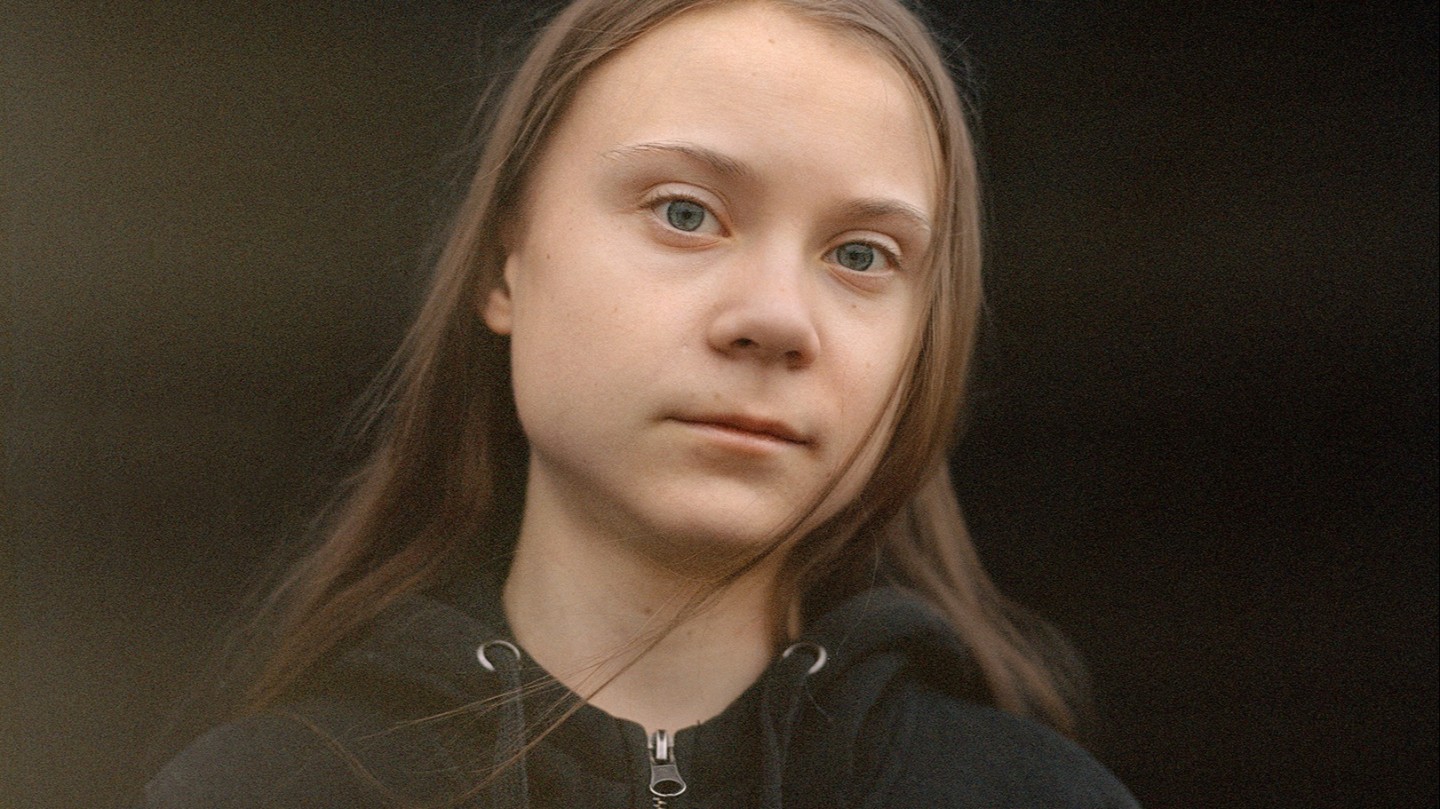
Roula Khalaf, Editor of the FT, selects her favourite stories in this weekly newsletter.
Greta Thunberg turned 18 a few months ago but occasionally she forgets that. “I actually can vote now,” she grins. But the words “we children” still sometimes slip into her sentences, out of habit. She is sanguine about the change, but it is a bigger shift than she lets on: that phrase has been a core part of her message.
Thunberg became the world’s most celebrated climate activist on the back of this idea: that children have to wake the world up to the reality of climate change. She was just 15 when she started the “school strike for climate”, for which she skipped classes and sat outside the Swedish parliament — at first alone and later with dozens, then hundreds of others every Friday. As the movement grew, aided by Thunberg’s speeches, millions of students joined in. She took a year off school, led protests all over the world and has been nominated for the Nobel Peace Prize three times.
But today, the world is very different. When we speak in mid-March, most of Europe is under some form of lockdown. Thunberg is at her family home in Stockholm — her dad’s exercise bike and some houseplants form the backdrop of our Zoom call. She’s also back at school, and isn’t cutting classes on Fridays any more: protests during the pandemic have been mostly virtual.
Searching for an upside to the current situation, I ask whether she sees any silver linings from the crisis, which caused global emissions to drop by 6 per cent last year.
“The corona pandemic brought nothing positive,” she says bluntly. “The emissions reductions we could see were temporary and accidental . . . They didn’t occur due to us actually trying to reduce emissions. So this has got nothing to do with climate action.” But the pandemic does contain a lesson, she says: “It proves that the climate crisis has never once been treated as a crisis. It just puts it in a different light.”
Thunberg became the face of the climate movement when it was enjoying a great deal of success. In the past two years, dozens of countries have announced targets of “net zero” emissions by 2050, which would mean virtually stripping fossil fuels from their economies. China and the US, the world’s two largest emitters, have both made climate change a diplomatic priority. Many of the world’s dirtiest companies have pledged to cut emissions. And images of thousands of children marching through streets in protests inspired by Thunberg have galvanised a political focus on climate change that would have been unimaginable a few years ago.
“The Greta Effect” has become a phenomenon with a life of its own. It has also become the subject of study and debate, not all uncritical, by activists, academics and executives. They are asking how much of Thunberg’s impact is personal and how much is due to timing; where she goes next; and how long-lasting, in slow-changing economies and industries, her impact will prove to be. And these are questions that Thunberg is also asking herself.
Why does she think she became famous? “I don’t know,” she says. “I guess it was just the right thing at the right timing . . . People were ready for this kind of thing, and then it just sort of [took] off. And one thing led to another and, yeah, it just spiralled out of control . . . or at least, out of what was reasonable.”
The last time we met was two years ago, when we had lunch together in Stockholm. Although Thunberg is outwardly similar, over the course of our conversation it becomes clear how much she has grown up. She is much more confident and relaxed, and gives long and complicated answers when it comes to her favourite topics, such as the pitfalls of net-zero targets.
She still struggles a bit to make small talk, common among people who have Asperger syndrome, a form of autism. What is it like being back at school? Very different from before, she says. What does she think of the recent climate targets set by major economies? “[My views are] completely irrelevant . . . We shouldn’t be focusing on whether individuals think it is enough or whether I think it is good.”
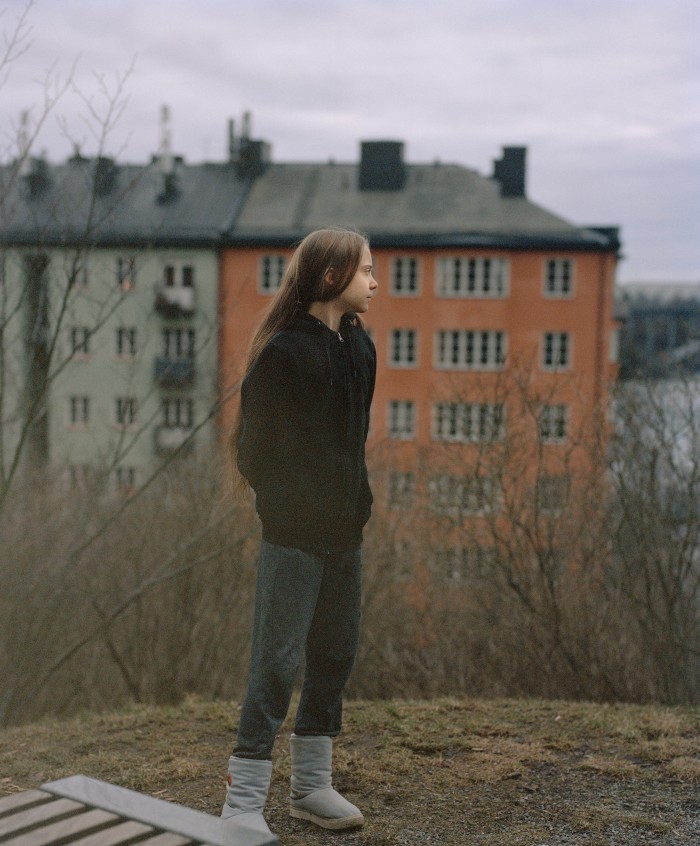
But after a slightly prickly start we settle in. Thunberg begins to work on some embroidery as she talks — a piece she has designed for a friend who is a climate activist in the Netherlands. “I can do these things during online classes,” she explains, as a red thread slides across the video screen. “I concentrate better when I do something at the same time.”
I ask how her message has evolved in the past few years. Thunberg has long avoided detailed discussion of what the solutions for climate change might be — she insists that is for other people to figure out. But is it time to start thinking more about the solutions now?
“If I would start talking about, like, taxes, or things like that, since I have such a big reach, that would send a signal that the climate crisis is an issue that can come down to party politics. And that really minimises this crisis,” she says.
“We need to stop focusing on dates and numbers and actually accept and acknowledge the fact that we need to reduce our emissions right now. We can talk about 2030 or 2040 as much as we want. But it is what we are doing now that really matters.”
The Paris agreement of December 2015 prompted countries to gradually set more ambitious targets, and the rise of social media meant that a new type of protest movement could spread among a younger generation. But there was also something special about Thunberg herself.
In one of her most famous moments on stage, she addressed the UN Climate Action Summit in New York in September 2019. “How dare you?” she asked the audience of assembled grandees, with what looked like tears of rage in her eyes. “You have stolen my dreams and my childhood with your empty words.” Thunberg’s speech went viral, dominating headlines about the summit.
Did she really feel that angry or was she putting on a bit of a show? “Well, I mean — both,” she says. “I knew that this was a once-in-a-lifetime opportunity, so I better make the most out of it. So I allowed myself to let the emotions take over.”
She seems bemused, though, that the popular image of her as an angry teenager has persisted. “I never get angry,” she says with a small chuckle. “If you ask anyone who is in my close environment, they would probably laugh at that statement.”
Online, Thunberg’s wry humour comes through in her tweets, and she has taken down her critics, including former US president Donald Trump, who accused her of having an “anger management problem” in 2019 and told her to go and see a film to relax. After the US election she turned his own words against him: “Donald must work on his Anger Management problem, then go to a good old fashioned movie with a friend! Chill Donald, chill!” Her sense of humour seems to be thriving under lockdown.
Other young activists inspired by Thunberg say that her voice was one they identified with. “What she did was just monumental, it really kickstarted the youth movement,” says Dominique Palmer, a British student and climate justice activist who joined the Fridays for Future demonstrations. “In the speeches that she gives, she says everything very clear-cut and exactly like it is. That was very refreshing for a lot of people.”
The effect that Thunberg has on her audience is one of the things that is unique about her, according to a study published this year in the Journal of Applied Social Psychology. “There are a lot of people who think she has done nothing,” says Anandita Sabherwal, lead author of the paper, “The Greta Thunberg Effect”, and a doctoral student at the London School of Economics. “Our research shows that is not true, that she has changed [people’s] mindset.”
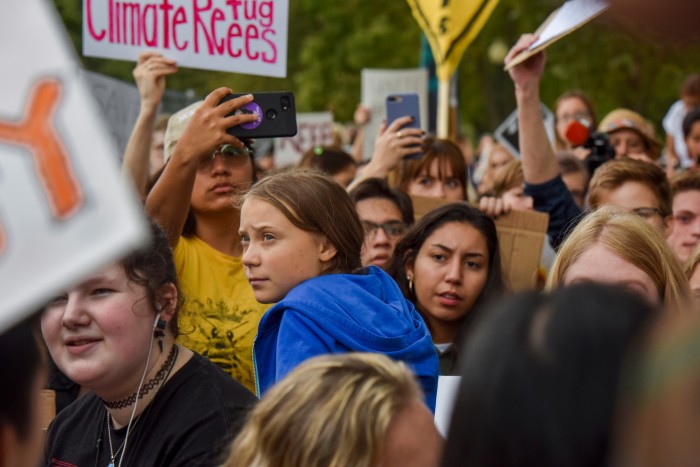
Sabherwal’s paper found that people who had heard of Thunberg were likely to feel a stronger sense of “collective efficacy”, the belief that they could make a difference by acting together. The sample size was small — about 1,300 US adults — but Sabherwal thinks the effect may be even more pronounced in young people, who were not included in the survey.
The surge of youth activism has already had some real-world impacts, including court cases over climate change brought by children. A recent legal challenge in Australia seeks to stop fossil-fuel extraction in the country on the grounds that the government is violating its “duty of care” to protect young people from climate change. (A similar case in the US was dismissed last year.)
In the corporate world, too, Thunberg’s name has been ubiquitous. “A year ago, I could not have gone into a boardroom without someone referring to her, to Greta specifically, or to the movement,” says Peter Bakker, president of the World Business Council for Sustainable Development. “Greta and her movement have played an incredibly important role in raising awareness.”
FT series: A New Deal for the Young
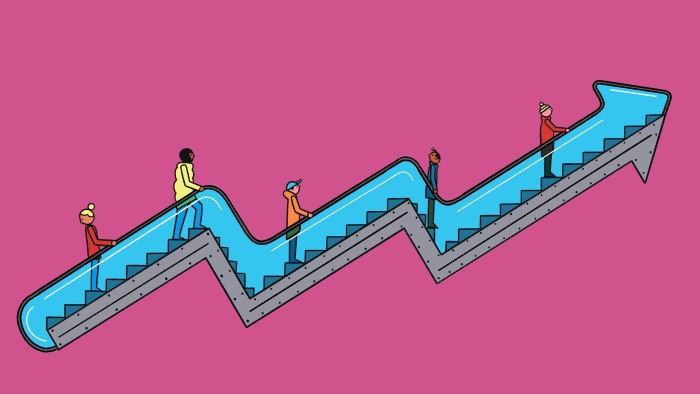
What would make the economy work better for today’s youth? FT writers will make the case for policies that would change housing, pensions, jobs, education and the environment for younger generations in a series of opinion pieces the week of April 26-30.
Join us for a series of live debates in that week, every day at 2pm BST, and share your own ideas and questions. Register for free
A search through transcripts of corporate presentations shows that Thunberg’s name pops up in unlikely places. The chief executive of Deutsche Börse, the German stock exchange group, cited her when introducing its work on sustainable finance. The head of a large uranium mining company pointed to Thunberg when giving his prognosis for the future of the nuclear industry. A tractor manufacturer referred to her as it outlined its plans for low-emissions farm vehicles. The list goes on.
“She is a presence — sometimes explicit, always implicit — in the debates that are taking place, about the societal concern over climate change and the need for companies to be seen as good actors,” says Mark Lewis, chief sustainability strategist at BNP Paribas Asset Management.
Some think Thunberg gets a bit too much credit. Mike Hulme, a professor of human geography at Cambridge university, likens Thunberg to the polar bear as the latest climate icon. “Fifteen years ago, wherever you looked, the polar bear popped up . . . And for a period, wherever you looked, Greta Thunberg seemed to be on stage.”
But Kingsmill Bond, energy strategist at Carbon Tracker, a climate change think-tank, says: “The big thing that is different now to any other time in the last 50 years, in attempts to take climate more seriously, is that the economics now work. And that is the big shift that has happened. So instead of pushing water uphill, we are now pushing water downhill.”
In many parts of the world, renewable energy is now cheaper than its fossil fuel equivalent. The cost of solar panels has fallen more than 80 per cent over the past decade, while the cost of batteries is one-seventh of what it was 10 years ago. The affordability of renewable energy has in turn prompted many governments to promise to cut their emissions; by one count, around two-thirds of the global economy is covered by some form of zero emissions pledge.
“She seized the moment,” Bond says. “It could have taken a very long time. You could say the same about any leader — that change would have happened regardless — but you do actually need people to do it.”
Thunberg doesn’t expect her fame to last. “I’m surprised that it has stayed so long,” she says. “I’ve not really still grasped it, in a way . . . You have to keep yourself distant from these kinds of things, you can’t let this occupy your personal life. Because when all this focus [on me] disappears, which it will very soon . . . then that could be a hard thing to handle.”
One thing she is grateful for is that she can still go about her daily life in Stockholm undisturbed. “I’m very lucky in Sweden, we have this thing called Jantelagen . . . no one comes up to you,” she says. “If I go to another country, even if it’s just Denmark or Norway . . . then I can’t walk down the street without people stopping me. But here in Sweden no one even looks at me. I can see in their eyes that they know it’s me, and that they recognise me, but they don’t stop me. Which is quite nice, actually.”

She is unsure what the next steps will be for the climate youth movement. “We have learnt during this last year that nothing can be taken for granted, that we can’t plan things in advance.”
Even though she is not a child any longer, she says her primary tool has not changed — using the moral high ground to ask the adults to do the right thing. “People say that we shouldn’t be using morals, or like, shaming people, or using guilt or whatever. But since we don’t have any globally binding agreements, that’s all we have . . . It’s the only resource we have available at hand.”
In many ways Thunberg’s platform shows the great power that protest can have — but also its limitations. Making demands can go a long way. But the child activists will grow up. And the next steps in the climate movement are likely to fall to scientists, policymakers or engineers.
With the UN climate summit, COP26, coming up later this year in Glasgow, I ask if she thinks it can make a difference. Thunberg has attended several recent climate summits, first as a little-known activist in Katowice, Poland, in 2018, and the following year as a celebrity in Madrid and New York. She says she will probably go to Glasgow, “if it doesn’t get cancelled again, and if I get invited”.
Climate Capital
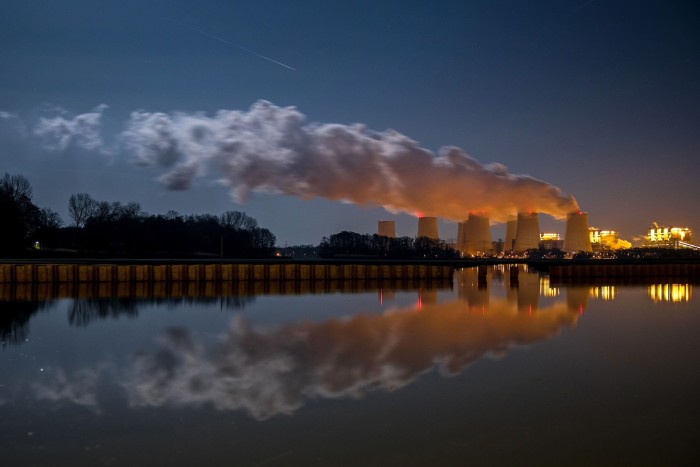
Where climate change meets business, markets and politics. Explore the FT’s coverage here
But she thinks the previous summits all failed — and Glasgow won’t be any different. “We can hold these conferences and meetings for eternity, over and over again, as many as we want. That still won’t lead to any change. Unless we . . . actually start acknowledging this crisis and admit that we have failed thus far.”
Her dogs, Roxy and Moses, are barking at the door, and her embroidery has paused. I ask if she knows what is next and whether she thinks she’ll keep working in the field of climate change.
“Unfortunately, yes,” she tells me. “The wish would be that everything would just be all right. And that there wouldn’t be a need for climate activists. But to be realistic, that’s probably not going to be the case . . . One thing is for sure, we are still going to do everything we can, based on the circumstances. And continue to communicate the science, and to be a pain in the ass for people in power,” she says with a little laugh.
Leslie Hook is the FT’s environment and clean energy correspondent
Follow @FTMag on Twitter to find out about our latest stories first
Follow @ftclimate on Instagram
Letter in response to this article:
Remember everything in nature has a purpose / From Joanna Pallaris, London E9, UK
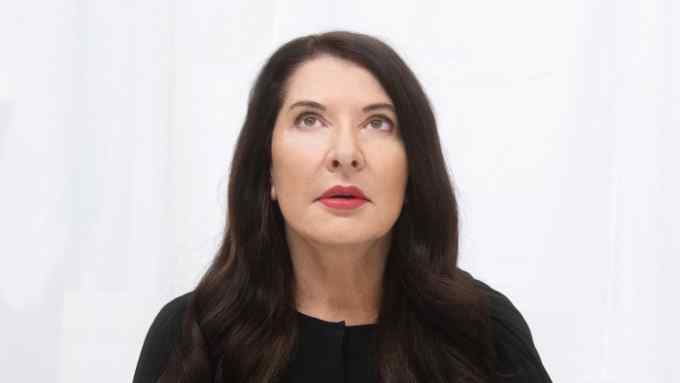
Comments